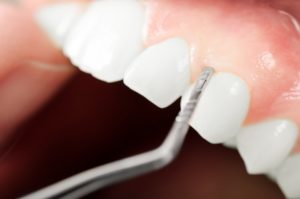
Gingivitis is a common type of gum disease, and it can be reversed if symptoms are recognized in their earliest stages. The earlier gingivitis is detected and treated, the greater the chance that it will be reversed instead of advancing to a more serious form of gum disease.
What is gingivitis?
Gingivitis is a mild form of gum disease, and if it’s not treated, it can lead to a more serious form of gum disease called periodontal disease. Periodontal disease (periodontitis) can damage the soft tissue and bone surrounding your teeth and eventually lead to tooth loss.
What are the types of gingivitis?
Gingivitis is generally classified by two types: dental plaque-induced and non-plaque-induced. Plaque-induced is caused by the buildup of plaque, and non-plaque-induced gingivitis can be related to viruses, genetic disposition, or other causes.
What are the common causes of gingivitis?
The following are some of the most common causes of gingivitis:
- An accumulation of bacterial plaque around and between teeth – This is the most common cause
- Hormonal changes – including those that occur during pregnancy, puberty, and menopause
- Diseases – such as cancer, HIV, and diabetes
- Medications – including Procardia and Dilantin
- Poor oral hygiene habits
- Smoking
- Genetics – having a family history of dental disease
- Poor diet – such as having a vitamin C deficiency
What are the symptoms of gingivitis?
In some cases, mild gingivitis may not cause any obvious symptoms. When it causes symptoms, they may include the following:
- Bright red gums
- Tender, painful gums
- Gums that bleed when you brush or floss
- Bad breath
- Gums that pull away from your teeth
- Swollen gums
Can gingivitis cause stomach problems?
Gingivitis can sometimes be linked to issues in other parts of your body, such as your stomach. The bacteria that are present in your mouth when you have gingivitis are some of the same type that causes gastric ulcers. As this bacteria travels to your stomach, it can cause the ulcers to become re-infected.
Does gingivitis go away on its own?
Very mild gingivitis can sometimes be reversed with good oral care habits, including brushing at least twice a day, flossing daily, using antibacterial mouthwash and getting regular checkups. It can also help to stop smoking and eat a healthy diet.
Does brushing gums help gingivitis?
Brushing your teeth and tongue is important but brushing your swollen, tender gums may irritate them. Talk to your dentist about what’s best in your particular case.
Does gingivitis smell bad?
Persistent bad breath can be an indication that you have gingivitis or more advanced gum disease.
How do I know if my gingivitis is getting better?
The symptoms of gingivitis, such as bleeding gums, should improve if your gingivitis is getting better.
Can you get rid of gingivitis at home?
You can take steps to get rid of gingivitis at home, but a dental hygienist can remove far more plaque with a professional cleaning that you can do at home. In addition, your dentist can monitor your gingivitis and if needed, can perform additional procedures such as scaling and root planing, a type of deep cleaning used to treat gum disease.
If you have bleeding or tender gums or any other symptoms of gingivitis, make an appointment today with Cedar Mountain Dental in Newington, CT. We provide everything from regular checkups and cleanings to emergency care and take pride in creating an exceptional, personalized treatment experience for each patient.


